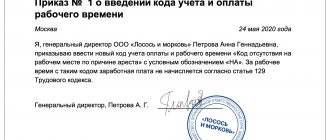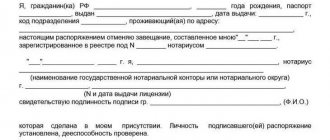Kontur.Accounting - 14 days free!
Personnel records and employee reports, salaries, benefits, travel allowances and deductions in a convenient accounting web service
Try it
An employee can resign at his own request. For an employer, the sudden dismissal of an employee is associated with many inconveniences. Therefore, the law provides for a two-week working period. But there is always a possibility that the employee will not want to work the required 2 weeks. The law provides for such a possibility, and today we will talk about the nuances of dismissing an employee without working off.
How to properly fire an employee
The grounds for termination of an employment contract are provided for in the Labor Code.
One of them is the statement of the employee himself. Also, the initiator of dismissal can be the employer (organization or individual entrepreneur), including in a situation where the employee has committed one or another violation or misconduct. In addition, termination of the employment relationship is possible regardless of the wishes of the parties to the contract - for example, if its validity period expires. Draw up and print an employment contract
For each reason, there is a list of steps that the employer must take to ensure that separation from the employee is legal. Let's look at the most common reasons for layoffs.
What could be the severance pay?
Formally, there are no strict restrictions. But with severance pay in the amount of more than three Tax Code of the Russian Federation Article 217. Income that is not subject to salary taxation (for the Far North and equivalent territories - six) it is necessary to pay income tax and insurance premiums. This may make the employer less accommodating as additional costs will be imposed on them. And the employee will lose 13% of payments.
Additionally, in some cases, the IRS may consider too large a severance payment to be suspicious. What if this is not compensation, but an attempt to dubiously enrich an employee and withdraw money.
Employees should remember this in order to quickly reach a compromise with the employer.
Dismissal of an employee at his own request
An employee has the right to demand termination of the employment contract at any time. It is enough to submit an application at least two weeks before the expected date of departure (Article of the Labor Code of the Russian Federation). For some categories of employees, a longer (for example, one month for the head of the organization) or shorter (for example, three days for those on probation) notice period has been established.
But this does not change the essence of the procedure. Dismissal at will does not require the consent of the employer. He is obliged to dismiss the employee after the warning period established by the Labor Code expires (or at an earlier date if the parties have agreed on this).
ATTENTION
There are cases when an employee has the right to receive payment on the exact day he indicated in the application. In particular, retirees and students who resign due to enrollment in an educational organization have this privilege.
Calculate all payments for a dismissed employee in the web service Calculate for free
Employee application requirements
As a rule, the application is submitted personally to the head of the organization or directly to the human resources department. It should contain:
- clear wording from which it follows that the employee wishes to terminate the employment relationship (“I ask to terminate the contract”, “I ask to be fired”, etc.);
- indication of the last day of work (“I ask you to resign at your own request on October 22”). The use of any prepositions in such a construction is not recommended, as this allows for different interpretations;
- personal signature of the employee. Without his signature, the document has no legal force and is not a basis for termination of the employment contract.
The employee is not obliged to indicate the reasons for dismissal of his own free will; he confronts the employer with the fact that he must terminate the employment contract.
Dismissal at the initiative of the employer
An employer has a much wider range of grounds for terminating an employment relationship. For example, he has the right to dismiss an employee who has not completed the probationary period, violated labor discipline, or submitted false documents during employment.
The reason for dismissal at the initiative of the employer may also be circumstances that do not depend on the behavior of the employee: reduction in the number of employees or staff of the enterprise; Liquidation of company. And it is permissible to dismiss the head of an organization at any time: both on the grounds specified in the employment contract, and without explanation (Article 278 of the Labor Code of the Russian Federation).
Draw up and print out an employment contract and order for free using Form No. 1-T
Next, we’ll talk in more detail about why you can fire an employee, and about cases when an employment contract can be terminated due to circumstances beyond the control of the parties. Each reason has its own procedure.
Termination of an employment contract at the initiative of the employee: sample application
There is no approved standard application form. At the same time, errors and inaccurate wording may cause the court to declare the dismissal illegal in the event of mutual claims and demand that the employee be reinstated, or, conversely, to acquit the employer for taking advantage of the situation and obstructing the one who wanted to resign.
Important! A resignation letter is an expression of the employee’s personal will. He must clearly formulate his voluntary desire to stop working and confirm it with a signature.
The application can be written in any way: by hand, on a computer or typewriter, but the signature must be made personally by the applicant. It is advisable that next to the signature there is a transcript of the surname. You cannot dismiss on the basis of an application with an electronic, fax, or signature made by an unauthorized person.
Another mandatory point: the last day of work must be indicated in the application without the pretext s. When, for example, it is written: “I ask you to fire me on January 22,” it is unclear which day of work will be the last - January 21 or 22.
It’s good if the company has developed a sample application that takes into account all the details.
You can familiarize yourself with the recommended sample resignation letter and learn about the nuances of filling it out in the article “How to correctly write a resignation letter - sample?”
Dismissal for absenteeism
The Labor Code considers absenteeism a gross disciplinary offense. Its commission allows the employee to be punished by dismissal (subparagraph “a”, paragraph 6, part 1, article of the Labor Code of the Russian Federation). But in order to terminate the contract, a number of actions must be taken.
Let's start with the fact that in most cases, dismissal for absenteeism can only be done within a month from the day the person was absent from work (Part 3 of Article 193 of the Labor Code of the Russian Federation, subparagraph “a” of paragraph 34 of the Resolution of the Plenum of the Armed Forces of the Russian Federation dated March 17, 2004 No. 2 ; hereinafter - Resolution of the Plenum of the Supreme Court of the Russian Federation No. 2). In this case, you must adhere to the procedure established by the Code for clarifying the circumstances of this offense.
First of all, it is necessary to document absenteeism itself—the employee’s absence from the workplace. In this case, it is advisable not to limit yourself to a mark on the time sheet, but to draw up additional documents: a memo addressed to the head of the company and an employee absence certificate.
Maintain timesheets and calculate salaries in the web service Try for free
REFERENCE
Absenteeism is the absence of an employee from the workplace without good reason, not only during the entire shift or day (regardless of their duration), but also for more than 4 hours in a row during the shift (day).
Then you need to ask the person to explain the reasons for his absence. Here you need to take into account the following nuances. If the employee is ready to write an explanatory note, there is no need to draw up a document requesting it. In this case, the very presence of an explanatory note will confirm that it was requested.
If the situation is conflicting or the employee is clearly stalling for time without drawing up an explanation, the request should be made in writing and handed over to the employee for signature. And if you refuse to affix it, prepare a corresponding act. The employee’s refusal to give an explanation is also confirmed by the act.
The truant is given two working days to draw up an explanatory statement (Part 1 of Article 193 of the Labor Code of the Russian Federation). Only those days that are working days for the employee are counted.
Once explanations have been received, it should be assessed whether the reason for the person’s absence from work is valid. The employer has the right to resolve this issue at its own discretion. However, it must be remembered that if the employee does not agree with the dismissal, then the court may have to assess the validity of the reason for absenteeism. Therefore, it is better to immediately interpret any controversial issues in this part in favor of the employee.
ATTENTION
If the reason for absence is recognized as valid or it is decided to limit oneself to a reprimand, the employment relationship with the employee is maintained, but the employer has the right not to pay for the period of absence.
This follows from the provisions of Articles 129 and 132 of the Labor Code of the Russian Federation. The explanation is simple - the person did not fulfill his job duties, and there were no legal grounds for maintaining his earnings. You can issue a dismissal order in the following cases: the reason for absenteeism is obviously unexcused, or the employee refused to give an explanation, and the employer does not have other information confirming that he had good reasons for absence. It must be remembered that dismissal is an extreme measure of punishment. This means that you first need to evaluate the possibility of using other measures: a reprimand or a reprimand. It is necessary to take into account the severity of the offense, the circumstances of its commission, the employee’s previous behavior and his attitude to work (clause 53 of Resolution of the Plenum of the Armed Forces of the Russian Federation No. 2). The reasons indicating the impossibility of applying a more lenient punishment are best reflected in the dismissal order.
Compose and print an order for free using form No. T‑8
IMPORTANT
You cannot fire an employee who is on vacation or on sick leave for absenteeism (Part 6 of Article of the Labor Code of the Russian Federation).
In this case, you need to wait until the employee appears at work again. At the same time, these periods are not taken into account when calculating the monthly period allotted for dismissal (Part 3 of Article 193 of the Labor Code of the Russian Federation). But it is prohibited to fire a pregnant woman for absenteeism under any circumstances. Even if the employer did not know about her pregnancy (Article 261 of the Labor Code of the Russian Federation, paragraph 25 of the resolution of the Plenum of the Armed Forces of the Russian Federation dated January 28, 2014 No. 1) Also see “What to do if an employee disappears” and “Dismissal for absenteeism: what is the best way to do it” register to avoid problems with SZV‑M and SZV‑STAZH.”
How to apply
The most reliable option for submitting an application is in person. 1 copy must be taken to the company office or handed directly to the manager. At the same time, on the 2nd copy, which remains in the applicant’s hands, the incoming number, date, surname and position of the person who accepted the document must be affixed.
If the administration refuses to accept the application, you can use the postal service and send it by registered mail with acknowledgment of receipt and a list of the contents, or by certified telegram. In this case, the employee will have documentary evidence of sending the document and its receipt by the addressee. The same option is used in the case of remote work. In this case, the countdown of the warning period will begin from the next day after the company receives the letter (its representative will sign the notification of delivery).
Important! You should be careful: if you do not take into account the delivery period, management may send the application back by mail, citing a violation of the deadlines, and its actions will be absolutely legal.
A resignation letter submitted by email is invalid because it will not contain the original signature. In controversial situations, a non-original document cannot be examined to identify the signature.
Dismissal for violation of labor discipline
This is possible if the employee has an outstanding reprimand or reprimand. If such an employee commits a repeated offense, the employment contract with him can be terminated (clause 5, part 1, article of the Labor Code of the Russian Federation). But only if no more than a month has passed since the violation of labor discipline, and a more lenient punishment than dismissal cannot be applied to the employee.
REFERENCE
Disciplinary punishment (reprimand or reprimand) is automatically lifted after one year, if the employee has not been punished again during this period.
No administrative document is needed. At the same time, the employer has the right to issue an order or instruction on the early removal of punishment (Article 194 of the Labor Code of the Russian Federation). The dismissal procedure in this case is similar to the dismissal procedure for absenteeism. That is, it is necessary to comply with the procedure and deadlines provided for in Article 193 of the Labor Code of the Russian Federation. So, first you need to record the disciplinary offense itself. This is recognized as failure to fulfill or improper performance by an employee of his duties (Article 192 of the Labor Code of the Russian Federation).
These responsibilities can be established in an employment contract, job description, or local regulations, which the employee is familiar with by signature. And some are enshrined directly in the Labor Code (for example, Article 214 of the Labor Code of the Russian Federation stipulates the responsibilities of an employee in the field of labor protection).
Thus, a violation of discipline will be the employee committing actions that are prohibited by the employment contract, job description, local regulations or the Code. Or failure to perform actions that the employee is obliged to perform by virtue of the listed documents. In particular, systematic lateness to work (early leaving) or refusal to go on a business trip are violations of labor discipline.
Violation of discipline can be recorded by various documents: a memorandum, an act, a time sheet, etc. Next, as in the case of absenteeism, it is necessary to obtain an explanation from the employee of the reasons for the misconduct and resolve the issue of their validity. Then, taking into account all the circumstances of the case, as well as the employee’s previous behavior and attitude to work, a decision on punishment must be made. If it is impossible to apply a reprimand, including a repeated one, you can terminate the contract.
Prepare a termination agreement for free using a ready-made template
Who should I approve my resignation letter from?
So, the application has been written, and many people have a question: do you need to coordinate your dismissal with your immediate superior? Let us turn again to Art. 80 Labor Code of the Russian Federation:
Based on the wording, the person resigning must notify the employer. The employer is the director (or the person replacing him). Accordingly, the law does not oblige you to coordinate the application with other employees of the company.
But in the internal local regulations (for example, in the regulations on remuneration or in the employment contract), the employer may record a list of employees with whom the dismissal must be agreed. Therefore, if you do not want to enter into conflict with your employer, it is better to do everything according to the rules established by the company.
If you fundamentally do not want to talk about leaving to one of your employees, you have the right to convey:
- an application to the director or the human resources department, asking you to sign your copy;
- by mail.
ATTENTION! We do not recommend sending a scanned copy of your resignation letter by email. The employee must submit a written application on paper. In this case, the employer has the right to refuse to terminate the contract, and the court will side with him, since electronic correspondence does not prove the employee’s intention to leave the organization (appeal ruling of the Supreme Court of the Komi Republic dated March 29, 2018 in case No. 33-1853/2018). We told a similar story here.
If the director does not want to sign your application because it is not agreed upon, you can remind him that forced labor is prohibited in Russia (Clause 2 of Article 37 of the Constitution of the Russian Federation) and you will be forced to go to court.
Reduction in the number of employees
Dismissal “due to reduction” (Clause 2, Part 1, Article of the Labor Code of the Russian Federation) is currently used quite often. As a rule, the reason for downsizing is a reduction in the volume of work (optimization of the number of employees), and for staff reduction - a change in the type of activity (dismissal of all employees who held the relevant positions). There are no fundamental differences in the procedures for dismissal on these grounds.
Create a staffing table using a ready-made template Try for free
The decision on the need for layoffs is made exclusively by the employer (Part 1 of Article of the Labor Code of the Russian Federation, Clause 10 of Resolution of the Plenum of the Supreme Court of the Russian Federation No. 2, determination of the Constitutional Court of the Russian Federation dated July 15, 2008 No. 413-O-O). However, he must be ready to justify the feasibility of this measure (determination of the RF Armed Forces dated December 3, 2007 No. 19-B07-34).
Under no circumstances can you be fired “due to reduction” (Article 261 of the Labor Code of the Russian Federation, Article of the Federal Law of June 12, 2002 No. 67-FZ):
- pregnant women;
- women with a child under three years of age;
- single mothers raising a disabled child under the age of 18 or a child under the age of 14;
- workers raising a motherless child under 14 years of age (disabled child under 18 years of age);
- the sole breadwinners of a disabled child under the age of 18 or a child under the age of three in a family where there are three or more young children, if the second parent (legal representative) does not work;
- an employee who is a voting member of the election commission - until the end of his term of office;
- an employee who is a member of the election commission with the right to an advisory vote - during the election campaign.
Next, you need to determine which of the remaining employees has a priority right to keep their jobs. According to Article 179 of the Labor Code of the Russian Federation, the employer is obliged to retain those who have higher labor productivity and qualifications. And with equal productivity and qualifications, the following persons have protection from reduction:
- family workers with at least two dependents;
- the only breadwinners in the family;
- employees who received work-related injuries and occupational diseases during work;
- employees aimed at improving their skills without interruption from work;
- disabled people of the Second World War and combat operations to defend the Fatherland;
- other employees who are granted such a right by the collective agreement.
Even with a small staff, downsizing involves significant paperwork. First, you will have to determine those who cannot be fired on this basis at all (and for this, you may need to request additional documents from employees). Then, collect data on the productivity and qualifications of other employees. Analyze this information and distribute employees to the appropriate levels. Within each level, select groups of beneficiaries. Then identify those who will remain working and those who will have to say goodbye.
The latter must be given notice of the upcoming dismissal “due to reduction”. The date of termination of the contract indicated therein should not be earlier than 2 months. The notification must also be sent to the employment service authorities.
IMPORTANT
Data about each laid-off employee is transmitted to the employment service, in particular, about his position, profession, specialty and qualification requirements (clause 2 of article 25 of the Law of the Russian Federation of April 19, 1991 No. 1032-1).
In 2021, employers were required to post this information in the all-Russian vacancy database “Work in Russia” (clauses 1 and 4 of Decree of the Government of the Russian Federation dated April 12, 2020 No. 486). It is expected that this duty will be extended into 2021. For more information about the “Work in Russia” service, see “The transition to electronic personnel documents and the “Work in Russia” service: what employers need to know.” Order an electronic signature to use the “Work in Russia” service Receive in an hour
All layoffs must be offered available vacant positions - both those corresponding to their specialties and qualifications, as well as lower-ranking or lower-paid ones. The main thing is that they are suitable for the employee due to health reasons, and the place of work is in the same area (the possibility of transfer to another area must be agreed upon in advance in a collective or employment agreement). If new vacancies become available during the two-month notice period, they must be offered to redundancy candidates first. And only then can you replace them with new people.
Although the Labor Code does not require confirmation that laid-off employees have been offered vacancies, it is better to issue notifications and hand them to employees against signature. And if you refuse to sign, draw up an act.
ATTENTION
Employees who are on sick leave or on vacation can also be fired “due to reduction.”
But only after the period of rest or temporary disability ends. Also see “Payments when laying off an employee in 2021” and “How, according to the new rules, to pay compensation when reducing staff or liquidating a company.”
Dismissal upon expiration of the employment contract
The expiration of the period for which the employment contract was drawn up gives the employer the right to dismiss the employee (Clause 2, Part 1, Article of the Labor Code of the Russian Federation). But there is an important nuance: dismissal will not happen automatically. If the employment relationship continues after the period specified in the contract, it will be transformed into an unlimited term (Part 4 of Article of the Labor Code of the Russian Federation). Then dismissal on this basis will become impossible.
ATTENTION
Termination of the contract should be formalized on the very day when its validity period expires, even if this day is a weekend (appeal rulings of the Moscow City Court dated January 24, 2020 in case No. 33-7835/2020, 2-1694/2019 and the Krasnoyarsk Regional Court dated 08/12/15 in case No. 33-8661/15)
Preparations for the dismissal of a conscript must begin at least three calendar days before the date of separation. It is during this period that a notice of termination of the employment contract should be given (sent) to him. The only case when this is not required is the dismissal of a temporary employee who performed the duties of an absent employee (Part 1 of Article of the Labor Code of the Russian Federation). A link to the notice details (date and number) will need to be given in the dismissal order.
IMPORTANT
Leave, including for child care, or illness of a temporary employee is not an obstacle to his dismissal due to the end of the contract.
There are specifics to the dismissal of pregnant conscripts, including those who are already on maternity leave. Thus, the employer must extend the employment contract with such an employee until the end of pregnancy (maternity leave), if there is an application accompanied by a medical certificate of pregnancy (Part 2 of Article 261 of the Labor Code of the Russian Federation). Accordingly, if a pregnant employee has not submitted these documents, then her dismissal upon expiration of the contract will be legal.
The second feature concerns the dismissal of a pregnant woman at the end of the contract, which was signed during the absence of the main employee. Such an agreement can be terminated provided that the pregnant conscript refuses the proposed transfer to another job, or there are no vacancies in the company at all (Part 3 of Article 261 of the Labor Code of the Russian Federation).
The dismissal order must be issued on the last day of the employment contract. This also applies to “conscripts” hired during the absence of the main employee - the dismissal order is drawn up on the day the permanent employee leaves.
Draw up and print out an employment contract and order for free using Form No. 1-T
Is it possible to change my mind
As a general rule, it is possible. But there is an exception.
Situation: continuous milling machine operator A. came to the HR department and filled out a resignation letter template according to all the rules. The production manager must ensure continuity of work, he quickly found the right employee B. to replace A. and invited B. to work on the translation, and he was able to quit without two weeks of work. However, A. suddenly changed his mind and decided to stay. In this case, contrary to the general rule, he cannot withdraw his decision and will be fired.
In other cases, a person may change his mind right up to the last working minutes of the last day of his work and even report this by mail or telegram, then the personnel officer must immediately stop the process of terminating the contract and reinstate the employee at work.
Dismissal due to health reasons
This is possible in two cases. The first is that the medical commission recognized the employee as completely disabled (clause 5, part 1, article of the Labor Code of the Russian Federation). The basis for dismissal will be a medical document that states a 100% loss of the ability to work. An order to terminate the contract must be issued immediately after the employee submits a medical report. The day of dismissal will be the last day on which the employee actually worked (Article 84.1 of the Labor Code of the Russian Federation).
The second case is that, in accordance with a medical report, the employee cannot perform his current job (a transfer to another is required), but he refused to change jobs, or the company does not have suitable vacancies (Clause 8, Part 1, Article of the Labor Code of the Russian Federation). There is a nuance here. Dismissal on this basis is possible if, based on a medical report, the employee needs to be transferred for a period of more than four months. If the rehabilitation (habilitation) program is set for a shorter period, and there is no possibility of transfer, then the employee should simply be suspended from work (Part 1 of Art., Part 2 of Article 212 of the Labor Code of the Russian Federation). But you can't fire him.
IMPORTANT
The four-month rule does not apply to the head of the organization, his deputies, or the chief accountant.
They can be dismissed “for health reasons” even if, according to a medical report, the transfer is required for a period of less than four months (Part 4 of Article of the Labor Code of the Russian Federation). After the employee has brought a medical report, from which it follows that he cannot perform current duties, he should be suspended from work (Part 1 of Article of the Labor Code of the Russian Federation). Next, you need to offer another job that is suitable for medical reasons, or notify about its absence. The Code does not establish the period and procedure for such notification. It is better to do this immediately and in writing. The dismissal order must be issued on the day the employee became familiar with the notice of the absence of a suitable vacancy, or an act of refusal to familiarize was drawn up. If there is such a job, but the employee does not want to transfer, the dismissal order should be issued on the day a written refusal to transfer is received.
Basic rules for the dismissal procedure
The general procedure for formalizing the termination of an employment contract is regulated by Art.
84.1 Labor Code of the Russian Federation. This article describes an algorithm of actions that must be followed. Termination of an employment contract is formalized by order (instruction) of the employer. Usually a unified form is used, which is approved by Resolution of the State Statistics Committee of the Russian Federation dated January 5, 2004 No. 1.
The employee must be familiar with the order against signature. A certified copy of the order can be handed over to the employee at the request of the employee.
According to general rules, the day of termination of an employment contract is always the last day of work of the employee, with the exception of cases where the employee did not actually work, but retained his place of work.
On the day of termination of the employment contract, the employer is obliged to:
- issue a work book to the employee (if the employee is not at work on the day of dismissal, he is sent a notice of the need to pick up the work book or agree to have it sent by mail);
- make a settlement with him in accordance with Art. 140 TK;
- upon written request of the employee, issue certified copies of documents related to work.
An entry in the work book about the basis and reason for termination of the employment contract is made in strict accordance with the wording of the Labor Code or other federal law, with reference to the relevant article, part of the article, paragraph of the article.
There has long been a dispute among HR specialists regarding which wording to use: “the employee is fired,” “the employment contract is terminated,” or “the employment contract is terminated”? The Labor Code does not give a clear answer to this question, so employers often choose the wording at their own discretion.
Dismissal for inadequacy of the position held
Termination of the contract due to inconsistency with the position held or the work performed (clause 3, part 1, article of the Labor Code of the Russian Federation) is possible if two conditions are met. First, the employee’s non-compliance is confirmed by a conclusion issued based on the results of certification. Secondly, the employee refused to be transferred to a job suitable for his health (including a lower-ranking and lower-paid one), or the company does not have such a vacancy.
But even if these conditions are met, it will not be possible to fire pregnant women and women with a child under 3 years of age “for unsuitability.” Also, single mothers raising a child under the age of 14 (a disabled child under the age of 18), and other persons raising such children without a mother, are not subject to dismissal on this basis. And equally, they are the sole breadwinners of a disabled child under the age of 18 or a child under the age of three in a family where there are three or more young children, if the second parent (legal representative) does not work (Article 261 of the Labor Code of the Russian Federation). The guarantees mentioned above for members of election commissions also apply (Article Law No. 67-FZ).
It is also impossible to part ways “due to inconsistency” with young employees who do not have the necessary production experience due to their short work experience. This is reported in the report of Rostrud. And it is permissible to dismiss on this basis those who are on vacation or sick leave only at the end of the relevant period (subject to the conditions listed above).
REFERENCE
Non-budgetary sector organizations, as a rule, independently develop and establish the procedure for conducting employee certification (Part 2 of Article of the Labor Code of the Russian Federation).
It is also possible to send employees for an independent assessment of qualifications (letter of the Ministry of Labor dated September 18, 2019 No. 14-3/B-742). The Labor Code does not establish a deadline for the dismissal of an employee who has not passed the certification. But it is in the employer’s interests to do this faster - on the day when the employee refused to be transferred to another job (has read the notice about the absence of a suitable vacancy).
Dismissal for loss of confidence
This is a special basis for terminating a contract with an employee who directly services monetary or commodity assets, that is, receives, stores, transports, distributes them (clause 7, part 1, article of the Labor Code of the Russian Federation, clause 45 of the resolution of the Plenum of the Armed Forces of the Russian Federation No. 2) . At the same time, the corresponding responsibilities must be documented - in an employment contract, job description, agreement on full financial responsibility, etc.
Draw up and print an employment contract tailored to your situation using a special constructor Draw up for free
A loss of trust can be indicated by guilty actions (cheating, weighing, fraud, etc.) committed by an employee both at the place of work and outside of it. It does not matter whether these offenses were related to the performance of labor duties or not (clauses 45 and 47 of the resolution of the Plenum of the RF Armed Forces No. 2). However, the employer must have documents that confirm not only the action itself, but also the employee’s guilt. These documents must be referred to in the dismissal order.
The specific procedure for dismissal depends on the circumstances of the case. So, if these actions were committed while performing job duties, then dismissal will be a measure of punishment for a disciplinary offense. This means that the employer must comply with the procedure and deadlines for bringing to responsibility. It is necessary to record the misconduct itself, obtain an explanation, assess the validity of the reason for the misconduct and make a decision taking into account all the circumstances of the case, the personality of the employee and his attitude to work (Articles 192, 193 of the Labor Code of the Russian Federation).
In other cases, dismissal can be carried out without additional procedures - on the basis of documents confirming the employee’s guilt. But here, too, there is a time frame: an order for dismissal for actions that were committed outside the place of work or at the place of work, but not in connection with the performance of job duties, can be issued no later than one year from the day the offense was discovered (clause 47 of the resolution Plenum of the Armed Forces of the Russian Federation No. 2).
Fill out and print STD-R and other personnel documents for free
Results
Drawing up a resignation letter is not a difficult task, but at the same time it requires the employee to understand some basic principles and norms of the Labor Code of the Russian Federation.
In particular, the employee must submit a resignation letter in writing, in free form, indicating a clearly defined intention to leave the organization, indicating the date of his last working day and confirming the application with a signature. The resignation letter can be written either by hand or on the computer.
The company, in turn, should understand that it is very important for it to have the original application signed by the employee.
Otherwise, the possibility of the court declaring such dismissal illegal cannot be ruled out. It is best to create an internal universal application form, which the employee will only have to sign and take to the HR department. You can find more complete information on the topic in ConsultantPlus. Free trial access to the system for 2 days.
Who should not be fired
The Labor Code established an absolute ban on dismissal at the initiative of the employer of two categories of workers. The first is pregnant women (Part 1 of Article 261 of the Labor Code of the Russian Federation). The second is for employees on vacation (including study leave) or on sick leave (Part 6 of Article of the Labor Code of the Russian Federation).
Less stringent restrictions apply to:
- women with a child under 3 years of age;
- single mothers raising a child under the age of 14 (a disabled child under the age of 18);
- father or other persons (including guardians and trustees) raising a child under 14 years of age (disabled child under 18 years of age) without a mother;
- the sole breadwinner of a disabled child under the age of 18 or a child under the age of three in a family where there are three or more young children, if the second parent (legal representative) does not work.
These employees can only be fired for certain violations. For example, for absenteeism, repeated violation of work duties, or due to loss of confidence (Article 261 of the Labor Code of the Russian Federation).
IMPORTANT
The prohibitions do not apply to dismissal “at one’s own request.”
On this basis, you can part ways with any employee at any time. Another exception is the liquidation of a company (without transferring its rights and obligations to other persons) or “closing” an individual entrepreneur (see “How to “close” an individual entrepreneur in 2021: step-by-step instructions”). In these cases, contracts with all employees are terminated (clause 28 of Resolution of the Plenum of the RF Armed Forces No. 2). Specifics regarding the dismissal of employees may be contained in other laws. In particular, as already mentioned, Law No. 67-FZ prohibits the dismissal of members of the election commission. However, the Constitutional Court of the Russian Federation clarified that this restriction is not absolute: if an employee has committed an offense not related to the exercise of the powers of a member of the election commission, then he can be dismissed in the general manner (decrees dated 02.28.17 No. 280-O and dated 10.26.17 No. 2330- ABOUT).
In conclusion, we note that strict adherence to the procedures for dismissing employees in 2021 will allow you to avoid claims from the state labor inspectorate and fines for non-compliance with labor legislation (Article 5.27 of the Code of Administrative Offenses of the Russian Federation). Also, you will not have to incur additional financial expenses to pay for the period of forced downtime for an employee if his dismissal is considered illegal.
What to do when the application does not indicate the date of dismissal
The employee expressed a desire to resign, but did not specify when exactly he wanted to do this. In such a situation, you should part with the employee exactly 14 days after registering the application. The consequence of earlier dismissal will be the automatic deprivation of the person’s right to withdraw his application within 2 weeks, therefore, if there are claims against the employer, the court will most likely recognize the dismissal as unlawful.
However, if an employee took everything he was supposed to (work, money), read the order against signature and did not go to work the next day (thereby indirectly confirming his agreement with the management’s decision to terminate the employment relationship at an earlier date), it can be considered that the parties Deal.
Dismissal later than 2 weeks can also be challenged. In this case, according to Part 6 of Art. 80 of the Labor Code of the Russian Federation, after the expiration of the notice period for dismissal, the employment contract must continue if the employee did not insist on dismissal.
ConsultantPlus experts have prepared a selection of controversial issues that may arise when an employee resigns voluntarily. Get trial access to the K+ system and go to the Guide to Labor Disputes for free.








